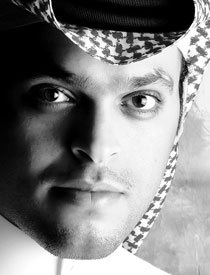THE Saudi photographer Abdulsalam Al-Tuwijri has opened his first exhibition at the King Fahad Library in Riyadh. The exhibition is set to run for three weeks and so far, it has welcomed more than 150 visitors every day. “This is my first personal exhibition. It is the product of five years of hard work. My actual start was in 2003. This is the time when I shifted my talent from a hobby into a profession,” said Al-Tuwijri.
He explained that his relationship with the camera began when he was 7 years old. “Beginning then, photography was my hobby and I was soon carrying my camera everywhere I went, in the Kingdom or abroad,” he said. He added that he had learned a great deal from foreigners who visit the Kingdom. “In addition, I have got both information and experience from different Arabic websites which specialize in photography. We exchange experiences and benefit with each other and we even get the chance to see each other’s work. Unfortunately, at present there are no government or even private institutions in Saudi Arabia that teach photography,” he said.
Al-Tuwijri has participated in five local events in which he joined other Saudi photographers. “Audiences in the Kingdom have been impressed with our work.” In 2005 in competition with some 20,000 photographers, Al-Tuwijri won the Golden Prize from the International American Better Photo Website.
“Photography is a culture. It is in fact a representation of the beauty around us. Picture taking enables us to distinguish one scene from another. Photographers tend to observe scenes from a different perspective than ordinary people. Photography is about stopping time at a particularly beautiful moment, a moment that will stay in the mind forever. Because of this, I feel regret about the many scenes my camera has failed to capture,” explained Al-Tuwijri.
According to him, the best time to take a photograph is two hours after sunrise or two hours before sunset. “This is the time when every color takes its full power from the sun and it is also the best time to get all the tiny and precise details of whatever you are photographing.”
Generally speaking, taking a beautiful and effective picture is not easy. “To take a special photo of the desert, I used to go before dawn, driving some 250 kilometers into the desert. I try to go to places where people have not been, and I often need a guide. I have gone to both Africa and Asia in search of a good photograph,” he explained.
Al-Tuwijri pointed out that photography could serve the country. “Ninety percent of my work documents Saudi tradition and culture. I have taken photos of horses, falcons, the desert and old buildings.”
The Saudi photographer said that he is very attracted to Arabian horses, “Along with their beauty and strength, horses impress me with their natural reactions,” he explained. He also added that some foreigners who have seen his work on the Internet were impressed and wanted to come to the Kingdom to experience the images they have seen. He has thus urged the Supreme Commotion for Tourism to support Saudi photographers and their art.
“Sometimes I go on a trip and take more than 400 photos but I select only the best 3 or 4. I do this to ensure that my photos are unique and represent my feelings. Later I give the photo a name to reflect my feelings,” said Al-Tuwijri. He also emphasized the importance of focusing on one element in the photo instead of including too many which distract the attenion.
He said that there were many restrictions which make it hard for him to carry his camera and take photos in the Kingdom. Saudi society, he said, does not understand or appreciate this art form and he feels that the lack of respect for it is due to people’s belief that photography is forbidden in Islam. The culture and inherited traditions also prevent a man from walking down the street with a camera and taking pictures. “People will think that you are carrying a weapon and will stay away from you. The case, on the other hand, is exactly the opposite abroad when you walk with your camera and people start asking you to take a photo of them! Some security men still insist that taking photos in public is banned though it is now licensed. I remember a security man who insisted that I must remove the film from my camera. I spent a long time convincing him that a digital camera has no film but he was never able to accept the idea.”
Al-Tuwijri admitted that photography can be expensive since a camera with accessories costs around SR15,000. Nonetheless, he said Saudi photographers must prove themselves in this field of endeavor. “Many Saudis of both sexes are now keen to try their talents, despite the fact that many others regard this hobby as a waste of time.”
Al-Tuwijri urges the Ministry of Culture and Information to establish a photography association. This association, he said, should run photography courses and workshops. It could even send photographers abroad and give certificates to distinguished Saudi and foreign photographers.
For more of Al-Tuwijri’s work visit:


